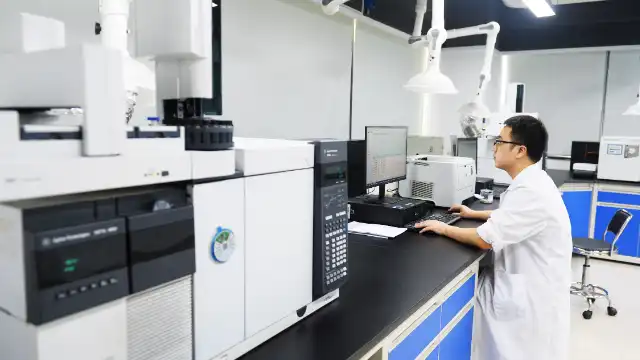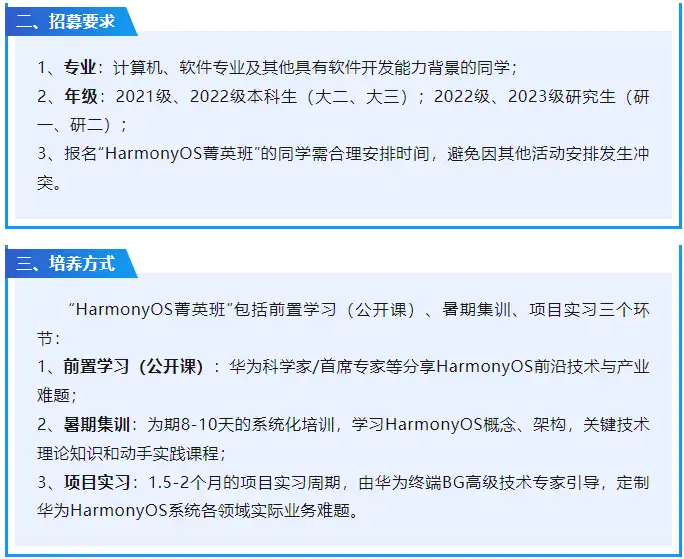Universities and enterprises work together to explore new models of talent training and create high-level applied talents
2024.0328

Number of words in this article:2860, reading time is approximately 4.5 minutes
introduction: 业内认为,在高校做科研注重的是要有新的想法和新的技术,企业做产品则是要解决系统性问题,需要依靠团队的合作。因此企业的研发思维模式与高校有很大不同。
** Author| ** First Financial Gold Leaf
Currently, the manufacturing industry is in a window of transformation and upgrading. There are many opportunities for the transition from low added value to high added value in the manufacturing industry. However, there are also some situations where talent training is incompatible with the needs of enterprises-the number of graduates is rising year by year, but companies cannot recruit satisfactory candidates. Faced with these situations, enterprises and universities have also begun to explore new training models.
Recently, the recruitment and selection notice for the "HarmonyOS Elite Class" of Shanghai Jiao Tong University-Huawei Technologies Co., Ltd. was announced, proposing to select about 30 talents with professional knowledge of terminal operating systems.
According to the announcement, the "HarmonyOS Elite Class" is one of the series of Huawei and leading university schools and enterprises to jointly cultivate talents in Hongmeng universities. The technical direction is locked in the HarmonyOS software field and selects and recruits computer/software students from the whole school.
"The training method includes three parts: pre-study (open classes), summer training, and project internships. The first open class is open to everyone, but the latter two classes require selection, including written examination and interview. Students who stay in the end can go to Huawei's Terminal BG Software Department for internship." Teacher Xue from the Student Innovation Center of Shanghai Jiao Tong University, the person in charge of the project at Shanghai Jiao Tong University, told reporters.
In addition to the above-mentioned training model cases, in order to change the mismatch between talent supply and the actual needs of enterprises, universities and enterprises are trying new training models, such as establishing a National Institute of Excellence for Engineers, implementing a special reform program for engineering masters and doctoral students, and opening private universities for entrepreneurs to train engineers for society.
Address the disconnect between education and front-line needs
According to estimates, China's manufacturing industry ranks first in the world in scale, but the proportion of manufacturing engineers in employees is seriously low. In 2020, the proportion of scientists and engineers in China's manufacturing industry was only 3.55%, far lower than the EU's level of 14.2%.
He Ying, director of the Institute of Science, Technology and Standards of the China Electronics and Information Industry Development Research Institute, wrote that from the perspective of the development needs of new industrialization and the current supply of engineering and technical talents, with the continuous demand for high-end, intelligent and green development of industry, especially manufacturing, China's engineering and technical talent team still has problems of mismatch between supply and demand and poor environment:There is insufficient reserve of complex "high-precision, high-quality and high-quality" engineers, and the supply of high-skilled talents is in short supply; talent training is disconnected from the actual situation on the front line, making it difficult to match the new needs of new industries such as green and intelligent; the policy incentive effect is limited, and the employment environment for engineers restricts the improvement of supply levels.
Take the "HarmonyOS Elite Class" that has cooperated with five domestic universities as an example. Software talents in this field are strongly related to practical applications.
Data from the Hunting Big Data Research Institute shows that undergraduate students and above account for more than 80% of Chinese software practitioners, and less than 20% of basic skilled talents below bachelor's degree. The mismatch between the existing talent structure and the actual needs of the industry is prominent, and the number of basic skilled talents needs to be expanded urgently. In addition, software companies are currently paying more and more attention to the practical capabilities of software industry talents. Judging from the current situation of corporate recruitment, most recent graduates with bachelor's degrees and above need a period of re-learning and adaptation after entering the workforce in order to master the practical skills required for their work. The results of a questionnaire survey of key enterprises show that less than 30% of fresh graduates are proficient in the skills required for the job within six months.

"The software field places more emphasis on individual practical ability, so you can see that in terms of selection conditions, we are not only open to master's degree, but also open to undergraduate students." Teacher Xue explained to reporters. In addition, students who can intern through elite classes also increase their chances of retaining in the company, because this selection process itself is very strict, and the people who stay in the end are already quite excellent."These intern students in elite classes will also Join in specific projects and put into real production practice."
Jiang Biwang, who was hired as a doctoral business supervisor at the School of Materials Science and Engineering at Soochow University last year, has also been calling for focusing on the combination of education and practice.
Jiang Biwang, founder of Nanwei Technology, who once taught in colleges and universities and later left to start a business, believes that doing scientific research in colleges and universities focuses on having new ideas and new technologies. When companies make products, they need to solve systemic problems, and often not one person. What can be accomplished requires team cooperation. Therefore, the R & D thinking model of enterprises is very different from that of universities.
"Recruiting doctoral students from top domestic universities to work in the company often takes more than a year to change the R & D thinking style cultivated by these doctoral students in schools, so that they can gradually adapt to the R & D needs of enterprises. Therefore, if we can introduce some concepts and thinking methods of marketization, industrialization, and productization at the postgraduate stage, the students trained will be more likely to adapt to the needs of the industry in the future." Jiang Biwang previously said.
Liu Qing, who is now the director of the Yangtze River Delta National Technology Innovation Center, has worked as a teacher and run a company. He once told First Finance and Economics to strengthen the practical experience of teachers in engineering colleges and universities. He said that most teachers in engineering colleges have no real corporate work experience, and they mainly work on topics at the theoretical level. During the National Two Sessions last year, he suggested that having corporate work experience should be a basic requirement for the qualifications of teachers in engineering colleges.
According to the "Professional Degree Postgraduate Education Development Plan (2020-2025)" issued by the Ministry of Education,"Professional degree postgraduate education mainly targets the needs of specific vocational fields of society and cultivates high-level application-oriented professionals with strong professional abilities and professional qualities and the ability to creatively engage in practical work." When explaining how to cultivate high-level applied talents, the relevant person in charge of the Ministry of Education said that training units are required to work with industries and industries to jointly formulate training plans, build practical courses, compile high-quality teaching materials, and carry out the construction of joint training bases.
The special reform projects for engineering master's and doctoral training carried out by many universities have also clearly stipulated the internship time in enterprises.
For example, since 2023, Peking University will support the construction and development of new engineering projects and launch special postgraduate enrollment work for the 2023 engineering master's and doctoral training reform. There are a total of 45 enrollment places in the three colleges of soft and micro science, materials, and future technology. They adopt a new training model of alternating front-line practice and work-study. Master's students study in school for the first year and practice in enterprises for the next two years. Doctoral students study in school for the two years before their death., practice in enterprises for the next three years.
Information from South China University of Technology shows that doctoral students are recruited to pursue professional degrees in five categories: electronic information, machinery, materials and chemical industry, resources and environment, and civil engineering and water conservancy. The specific department enrollment and majors are determined by the joint training enterprise. The academic system is 4 years, with about 1 year to study public courses and professional basic courses at South China University of Technology, and about 3 years to practice professionally in enterprises. The specific training process is determined through consultation between the enterprise and the school.
Entrepreneurs run schools
Just recently, Fuyao Glass founder Cao Dewang invested 10 billion yuan in Fuyao University of Science and Technology, and welcomed a new president. Wang Shuguo, who had just stepped down as president of Xi'an Jiaotong University, took over.
Since the university started construction in 2022, construction work has continued to advance. According to public information, Fuyao University of Science and Technology is positioned as a high-level scientific and engineering research-oriented international university, with undergraduate and postgraduate education levels. The school plans to start enrollment and opening in 2024, with a school scale of 12,000 to 13,000 full-time students, including 6000 to 6500 undergraduate students. The first batch of eight colleges is planned to be established, including Materials Science and Engineering, Computer Science and Technology, Mechanical and Intelligent Manufacturing, Vehicles and Transportation, Environment and Ecology, Economics and Management, Science and Humanities.
Cao Dewang publicly stated in an interview that students graduating from their school are engineers, and companies are also required to refer to the starting salary standard of engineers rather than the standard of ordinary graduates.
In earlier Chinese business circles, Geely Group has been running schools for 23 years. Since the establishment of the first Geely Industrial and Commercial School (now Zhejiang Automobile Vocational and Technical College) in 1997, it has established at least 9 colleges and universities, covering vocational high schools to At different training levels for graduate students, automotive engineering is the key training direction.
Tesla founder Musk, who was turned by engineer, also announced last year that he would donate US$100 million to open a primary and secondary school in Austin, USA, and would continue to expand his business with the ultimate goal of establishing a university. Previously, he had criticized American education many times on social media, including one reply saying,"SpaceX and Tesla have noticed that the ability of American college graduates has declined significantly in the past few years."
According to the plan, Musk's school will provide offline teaching and distance education. The overall education model will focus on STEM, namely Science, Technology, Engineering and Mathematics.
**
